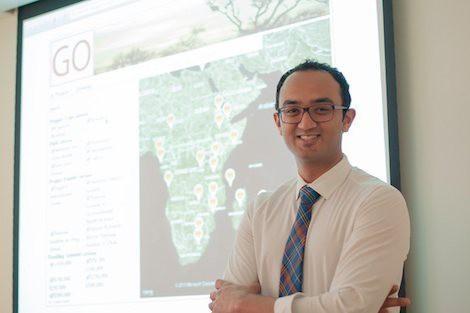May 6, 2013 — Three years ago, Oregon native Ali Chisti, MPH ’13, Carson Scholar, was on course to become a private practice neurosurgeon, studying medicine at Oregon Health and Science University in Portland. During the summers he worked as a caddie at a golf course in Bandon, along Oregon’s rural southern coast, to help pay for school. But in the summer of 2010 he learned about a fellow caddie’s health care troubles. Chisti’s friend had broken his wrist playing basketball. He went to the emergency room at a local hospital. But he didn’t have health insurance—and $12,000 in hospital bills later, he was forced to file for bankruptcy.
It got Chisti thinking long and hard about health care access and inequities—and led him to take a break from medical school to study health policy and management at Harvard School of Public Health (HSPH).
Volunteering at a rural clinic
Chisti’s friend could have gone instead to the Bandon area’s safety-net health center—the Waterfall Clinic, which offers reduced rates based on financial need—but the friend didn’t know about it because it had no website and the phone line frequently gave a busy signal. Chisti later learned that the clinic was also critically short on providers and had no system in place for referring uninsured patients to outside doctors or specialists.
Chisti volunteered to help the clinic. “I realized I had the opportunity to impact the lives of my neighbors and friends by helping develop improved health care access and resources in rural Oregon,” he said. For the rest of that summer, Chisti helped the clinic build a website, http://wfall.org, which he still maintains, and laid the groundwork for a referral network of both physicians and dentists.
He returned to the Bandon area the following summer to work at the Bandon Community Health Center, as part of the Oregon Rural Scholars Program. The program, run by the Area Health Education Center of Southwest Oregon, provides grant support for students pursuing health care careers in rural areas.
Broadening his scope at HSPH
At HSPH, Chisti has gained valuable skills—both in classes and beyond. He learned how to evaluate a clinic’s finances in an accounting class with Howard Rivenson, senior lecturer on health management. And Chisti plans to use skills gained in a class on qualitative methods in program evaluation, taught by Kate Baicker, professor of health economics in the Department of Health Policy and Management, to evaluate the impact of an anti-smoking/drugs education program for 6th-8th graders he helped develop in Coos County, Oregon in 2011.
Outside of class—prompted by an interest in improving access to cancer care—Chisti did a practicum with a Harvard-affiliated organization called Global Oncology (GO), aimed at improving cancer care and research in resource-limited parts of the world. Chisti helped the group’s website become a platform where volunteers can manage and collaborate on cancer projects. He worked with a Harvard Medical School student to organize a March 28, 2013 talk about cancer care in southern Africa. And at a recent MIT “hackathon” focused on international development—a 28-hour, round-the-clock event that teamed Boston-area programmers with nongovernmental organizations looking to solve particular problems—Chisti helped with GO’s effort to create a crowdsourced interactive map of cancer care outreach around the world. His team won an innovation award from athenahealth, a Watertown-based health services company that cosponsored the hackathon. Now the GO team is developing the platform as a resource to align the global cancer efforts of federal government agencies, university medical centers, and community-based organizations or NGOs. Chisti hopes to use similar mapping software back in Oregon to document public health efforts throughout the state.
Chisti is now considering specializing in oncology when he returns to his final year of medical school in the fall. He hopes to one day join the faculty at Oregon Health and Science University and become a physician leader in public health.
For the near future, though, he’ll pursue an internal medicine residency once he receives his medical degree. “That way,” he said, “I will be able to see patients from the moment they enter the health care system and guide them through to get the care they need.”
photo: Aubrey LaMedica
